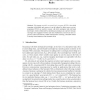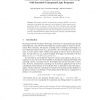284 search results - page 18 / 57 » Answer Set Programming for the Semantic Web |
116
click to vote
LPNMR
1999
Springer
15 years 3 months ago
1999
Springer
This paper continues the line of research on representing actions, on the automation of commonsense reasoning and on planning that deals with causal theories and with action langua...
FLAIRS
2007
15 years 2 months ago
2007
Web search engines like Google have made us all smarter by providing ready access to the world's knowledge whenever we need to look up a fact, learn about a topic or evaluate...
119
click to vote
ASP
2005
Springer
15 years 5 months ago
2005
Springer
We present extended conceptual logic programs (ECLPs), for which reasoning is decidable and, moreover, can be reduced to finite answer set programming. ECLPs are useful to reason ...
100
click to vote
ESWS
2005
Springer
15 years 5 months ago
2005
Springer
We present extended conceptual logic programs (ECLPs), for which reasoning is decidable and, moreover, can be reduced to finite answer set programming. ECLPs are useful to reason ...
110
click to vote
FUZZIEEE
2007
IEEE
15 years 6 months ago
2007
IEEE
— The Semantic Web can be viewed as largely about “Knowledge meets the Web”. Thus its vision includes ontologies and rules. A key requirement for the architecture of the Sema...


